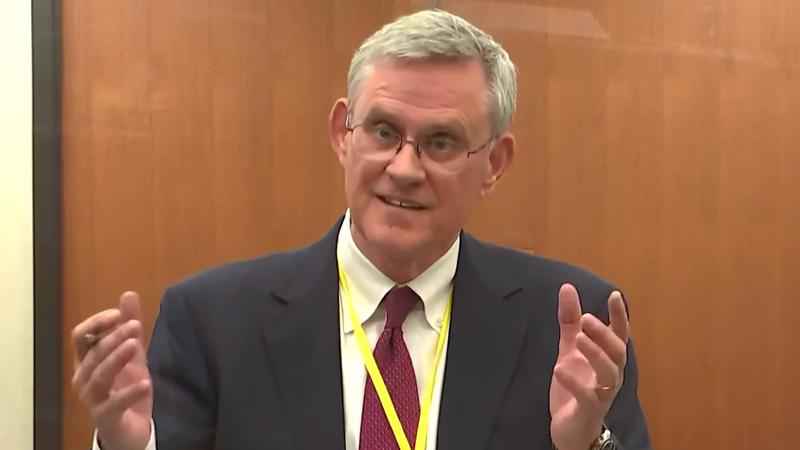As jury selection gets underway, attorney announces former Brooklyn Center officer will testify
[anvplayer video=”5074625″ station=”998122″]
Former Brooklyn Center Police officer Kimberly Potter sat between her attorneys, Earl Gray and Paul Engh as jury selection began Tuesday. Out of view of the courtroom camera, Daunte Wright’s parents watched the proceedings from their designated family seats in the courtroom.
The defense attorneys and Attorney General Keith Ellison’s team of prosecutors questioned 11 potential panel members. They picked four jurors on Day 1.
“There were a number of people today who I think recognized the seriousness of the duty of being a juror and tried very hard to communicate that they would not prejudge the case,” said Rachel Moran, an associate professor of law at the University of St. Thomas School of Law. “That may be one of the reasons the lawyers had a fairly smooth time selecting four people.”
District Court Judge Regina Chu oversaw the proceedings.
Hennepin County District Court identified Juror No. 2 as a white man in his 50s, Juror No. 6 is a white woman in her 60s, Juror No. 7 is a white man in his 20s and Juror No. 11 is an Asian woman in her 40s.

In this screen grab from video, defense attorney Paul Engh, questions a potential juror and Hennepin County Judge Regina Chu presides over jury selection Tuesday, Nov. 30, 2021, in the trial of former Brooklyn Center police Officer Kim Potter in the April 11, 2021, death of Daunte Wright, at the Hennepin County Courthouse in Minneapolis.[Court TV]
Questioning revealed Juror No. 2 is an editor for a medical publication, Juror No. 6 is a retired special education teacher, Juror No. 7 is an operations manager for Target and Juror No. 11 works in Minneapolis.
“Very different demographics in some ways but a similar sentiment of a willingness to listen,” Moran said.
During the voir dire of Juror No. 6, Engh revealed Potter will testify during the trial.
“I’m not surprised Kim Potter is going to be testifying but … it’s unusual to reveal that,” Moran said. “It’s unusual to reveal that at any point in the trial until the defendant actually testifies.
"Here, it’s obviously a calculated strategy to make that known from the beginning of the trial and I think it fits with the defense attitude in this case, which is unapologetic — she did nothing criminal and she is going to get on the stand and testify to the horrible tragedy that this was but that it was not a conscious act at all. That’s the defense tactic in this case.”
KSTP’s full Potter trial coverage
Potter won’t be the first Minnesota police officer to take the stand. Former St. Anthony Police officer Jeronimo Yanez testified while on trial for shooting and killing of Philando Castile. Former Minneapolis Police officer Mohamed Noor, charged with shooting and killing Justine Ruszczyk Damond, also took the stand.
“In some ways [Potter’s testimony] will be really similar because what we often hear from officers who have been accused of crime is that they were acting in the heat of the moment, they were responding to a difficult, stressful situation, and they had to make a difficult choice in that moment,” Moran said. “Where you’re going to hear something quite different is she will say this was a complete accident. So you have someone like Mohamed Noor, or other officers, who have been charged with gun-related crimes, saying, ‘Yes, I meant to fire my gun and I certainly didn’t intend to kill an innocent person’ or something like that. Here she is going to unequivocally testify that she thought she was using her Taser.”
Testimony is set to start Dec. 8. The attorneys need to seat 10 more jurors, for a total of 14.
The defense has four of its five peremptory challenges left, while the state has two out of its three peremptory challenges.
The state used its first strike to eliminate a retired fire captain who spent 31 years with the Minneapolis Fire Department. He said he retired six years ago.
The defense eliminated a juror who volunteered for Attorney General Keith Ellison’s campaign in 2018, voiced support for defunding the police and responded on the juror questionnaire she had a “somewhat negative” view of Potter.
“The state used one on someone that I would say seems like a close call,” said Moran. “Maybe they had more information in the juror’s written questionnaire than we were able to hear. They don’t have to articulate a reason but I thought that was a bold move in the sense that they have a limited number and they exercised one on someone who wasn’t an obvious poor fit for them, whereas, the defense strike, I think they found someone who was strong in their opinions and who had participated in protests.”